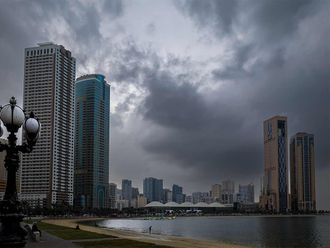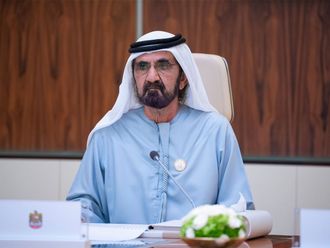Dubai: A new law to combat terrorism was endorsed by President His Highness Shaikh Khalifa Bin Zayed Al Nahyan yesterday.
The law will usher in new security measures to counter a sweeping range of crimes deemed acts of terror at a time when international efforts are being mustered to fight the global menace.
The government fast-tracked the law which establishes “terrorist” capital offences which result in the death of a victim, including attacks on a head of state or his family or a representative or officer of a state; coerced recruitment of individuals into a “terrorist” organisation; hijacking; hostage-taking; infringement of diplomatic or consular premises in committing a “terrorist” act; use of nuclear, chemical or biological weapons and assaulting security forces.
Important move forward
The law is an important move forward to ensure the stability of the country, Dr Theodore Karasik, Director of Research and Consultancy at the Institute for Near East and Gulf Military Analysis (INEGMA) in Dubai, told Gulf News yesterday.
“Any individual who is deemed to be against the UAE and its accomplishments will be punished by the full extent of the law,” Dr Karasik added.
Dr Karasik said the law is also important because there is a growing movement towards international cooperation to deal with the threat of terrorism, especially with groups such as Isil (Islamic State of Iraq and the Levant), Al Qaida and the Brotherhood.
Convicted terrorists will face capital punishment, life imprisonment and fines of up to Dh100 million, according to the new legislation.
The law defines a terrorist offence as “any action or inaction made a crime by this law and every action or inaction made a crime by any other law if they are carried out for a terrorist cause”.
A terrorist intent is established by a direct or indirect terrorist result or when an offender knows that the action or inaction leads, in its nature or context, to terrorist results.
Terrorist results include inciting fear among a group of people, killing them, or causing them serious physical injury, or inflicting substantial damage to property or the environment, or disrupting security of the international community, or opposing the country, or influencing the public authorities of the country or another country or international organisation while discharging its duties, or receiving a privilege from the country or another country or an international organisation, according to the draft law.
Counselling centres
Dr Abdul Khaleq Abdullah, a leading Emirati political analyst, called the law “the toughest ever issued by the UAE in more than 40 years” and said as terrorism can never be closer to the country and the region, the move sent a message to parties, whether inside or outside the country, that the UAE is off limits for terrorists. The UAE is a signatory to 13 international treaties on terrorism.
Ali Jasem, a veteran member of the House from Umm Al Quwain, said that the law authorises the Cabinet to set up lists of designated terrorist organisations and persons.
The Cabinet will also establish counselling centres where convicted terrorists will receive intensive religious and welfare counselling in jails in a programme targeted against future threats posed by those holding extremist views, according to the law, a copy of which was obtained by Gulf News.
Panel to combat terrorism
Every legal person whose representatives, managers or agents commit or contribute to the commission of any of the terrorist offences provided in the draft law, would receive a fine ranging from Dh1 million to Dh100 million.
A committee to be named The National Committee for Combating Terrorism will be established, and a decision towards its establishment will be made by the Cabinet.
“Whoever seeks or communicates with a foreign state, terrorist organisation or with anyone who works for their interests, to commit any terrorist act, shall be punished with imprisonment for life while the death penalty will be imposed if the terrorist act has been carried out,” the bill says.











